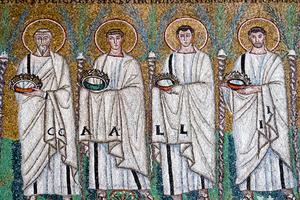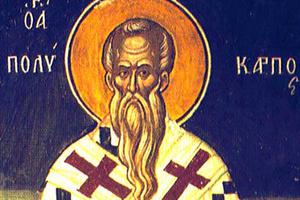Feb. 23 is the Feast of St. Polycarp
The Romans promised to free Polycarp if he’d declare ‘Caesar is Lord.’ He refused.

Feb. 23 is the feast day of St. Polycarp (69-155). He was Bishop of Smyrna (Turkey), fought heresy in the early Church, was friend to St. Ignatius of Antioch and martyred for his faith. His surviving works include a Letter to the Philippians, in which he quotes St. Paul.
Polycarp was a Greek-speaking Christian of the Roman Empire. He learned the Catholic faith in his youth from the Apostle John himself and used his knowledge to battle heretics, including those who said Christ was God but not man. He was proud of his association with the Apostles, and referenced them often in his teaching. He dubbed his opponents “anti-Christs” and “the firstborn of Satan.”
Polycarp ran afoul of Roman officials when he declared that Christ was a higher authority than Caesar. Polycarp fled arrest, hid and prayed. In a vision, it was related to him that he’d be burned alive.
A friend being tortured betrayed Polycarp to the authorities and he was captured. The Romans promised to free him if he’d declare “Caesar is Lord.” Polycarp refused. He was again offered a reprieve if he’d burn incense to Caesar. Polycarp again refused, and said, “I am a Christian … you threaten me with fire, which burns for an hour, and after a little is extinguished. But you are ignorant of the fire of the coming judgment and of eternal punishment, reserved for the ungodly.”
At age 86, he was martyred with 12 other Christians. He was burned at the stake and stabbed when it was observed that the flames did not burn him. He is today patron of those suffering from earaches.
- Keywords:
- st. polycarp
- martyrs















